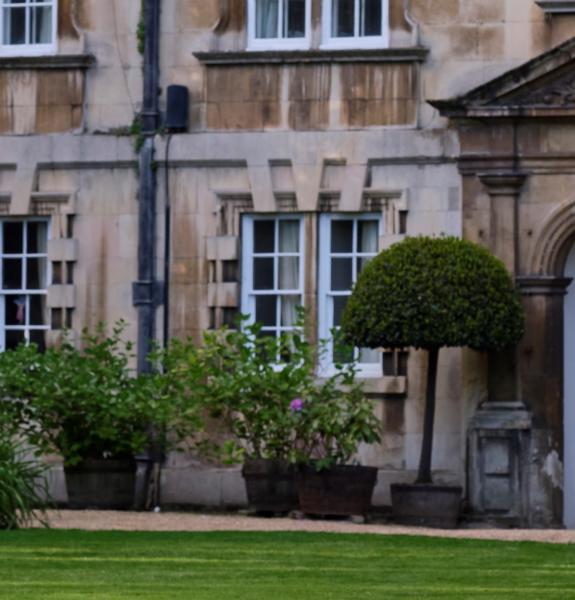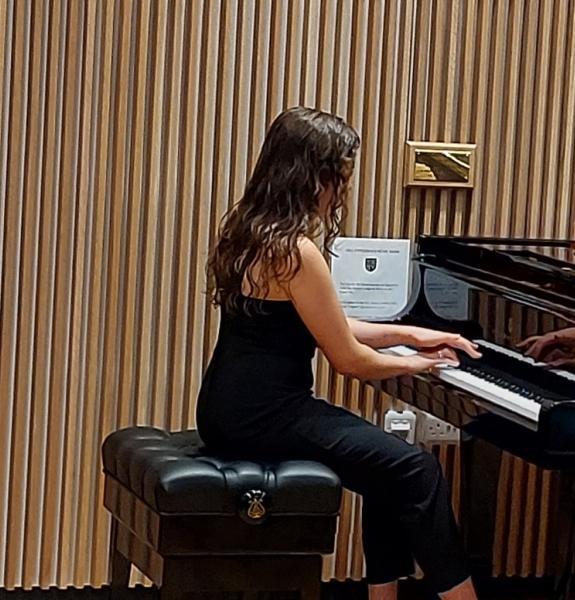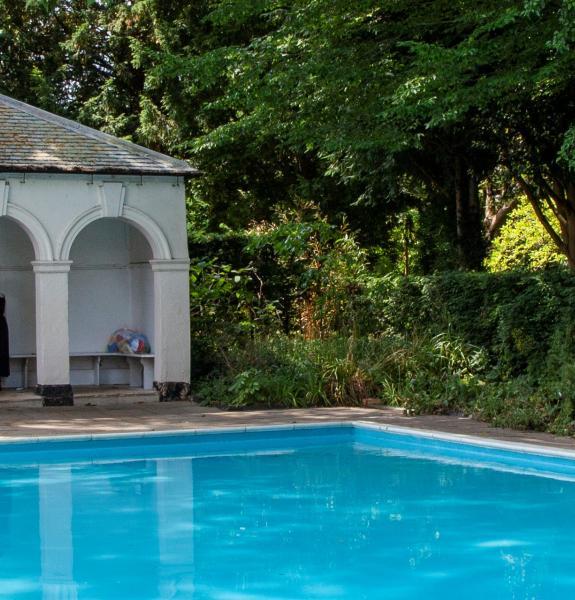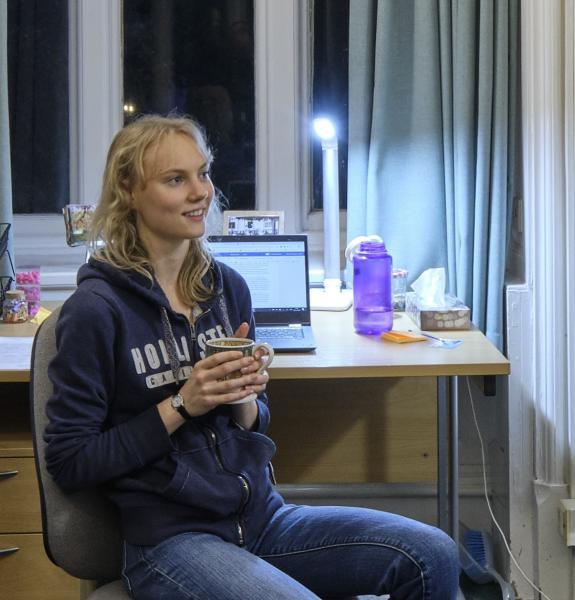
Alex is from Redbridge, North-East London, and wrote this at the end of his second year studying Mathematics at Christ's. At school, he did A-levels in Maths, Further Maths, Physics and Chemistry as well as STEP papers.
How does Maths at Cambridge compare with other universities or school?
The curriculum of a Maths degree is very similar at most universities. One significant thing that makes Maths here different to other universities is that you don't commit to any specific modules. Rather than choosing what papers and topics you want to study at the start of the year, at Cambridge each paper tests all topics. You only choose which topics you want to prepare for choosing in your exams quite close to the exams themselves. That makes it very flexible – you are exposed to all the content.
The big difference between Maths at University and A-level Maths is that the pure/applied split works differently. A lot of stuff you would call 'pure' at school: differentiation, integration and trigonometry, for instance, are on the Pure syllabus for A-Level, but would be categorised as applied at university. Unless we prove the result we're using, we are studying the thing in an applied style, whereas pure maths is all about proving results rigorously. It doesn't necessarily change your experience much, but it is something to bear in mind.
What were you looking forward to, and what were you nervous about before starting?

Academically, I was worried about the idea of "hitting the wall" in my subject: one of my teachers mentioned that there was usually only so far a given student can go in Maths, and once you hit that level of difficulty, you can't go any further. But now I'm here, I've realised that first year is about laying some groundwork, and second year is building on first year. Because the course is taken in such incremental steps, there is no reason there would be a "wall" to hit. It was a very encouraging finding!
Outside of studying, I was looking forward to having some autonomy, being away from home and deciding my own schedule. This is still something I really appreciate, I like being able to get on with things at my own pace. My biggest worry was getting on with people: like most students starting university, my friends were back in my home town, and I was concerned about how easy it would be to get people to like me and make new ones. In hindsight, this wasn't something I needed to worry about. I got on with the other people in my first-year corridor really well from the start, and we are still good friends now.

What made you apply to Christ's?
I came to Christ's on a Maths Open Day and we were spoken to by Dr Hunt. He reassured us that the application process was very objective (though I'm sure this is also true for other colleges), which alleviated my concerns about interviews. I was worried we might be judged on how charismatic we were in interview or whatever. I also liked the friendly atmosphere and accommodation when we were toured around, so for practical reasons Christ's seemed to be a good fit.
I definitely feel Christ's was a good choice now I'm here. The College seems to look out for us: we have all the facilities we could ask for in one place. And if we have any suggestions for things to improve, we can bring them to the JCR (our college-level Student Union), who'll do what they can to bring it about.
What's your favourite place in College?

Without a doubt, Upper Hall! The best thing about Upper Hall at Christ's is the unlimited sides. You pay for your main and with that get as many sides as you want, and can keep coming back for more if you like. The pasta salads and couscous are my favourites! I really like food so this is a big highlight of college life for me, and something people at other colleges are often jealous of.
How did you prepare for your application?
I did a fair amount of interview preparation; going through problem-solving questions and practicing talking my ideas out load proved very useful for that. I did a couple of mock interviews with my teachers, and I used other universities' practice admissions assessment questions (including MAT, the one used for Imperial and Oxford) to talk through in these interviews.
But honestly, most of my preparation went into STEP, an admissions assessment that all Cambridge Maths offer-holders have to do, normally at the same time as A levels. The question style for STEP is very different to A-Level, so it's very useful to get exposure and practice with that. The way the Faculty introduces you to STEP is through their STEP support programme: they provide you with questions grouped by topic, choosing questions that serve as a good introduction to the STEP style. I started looking at them in second half of Year 12 and start of Year 13; the second half of Year 13 was more focused on timed past STEP papers.
I expected that preparing for STEP is also helpful A-Level revision, but I didn't anticipate how useful it would be for my degree: revising for my university exams has been a similar process. Spending time getting used to questions by topic to begin with before launching yourself into mock papers has been an effective strategy for maths at all levels so far!
What were the interviews like?
I had one pure and one applied interview, in the University sense of pure and applied. In the pure one, they gave us a problem sheet to do beforehand. It was a lot like what my supervisions are now: the problems were similar to an example sheet, which we had to submit and then talk through in a supervision-like way. I found it a bit too scary to feel like I was in a supervision, but the way they did it made a lot of sense to me. It was definitely objective and focused on the maths, and was a good taster of what studying here would be like. For me, the pure one was mostly talking about the sheet, with a few unseen questions to work through; the applied one was all unseen questions.
What was starting at Cambridge like?
A fair portion of first term was spent figuring out my schedule in a way that worked for me. I think that's the same for a lot of people, it takes time to balance what you need to do with your time to make the most of everything and get things done.
It also took some time to work out what our supervisors were expecting of us; once we'd done that, it made our interactions a lot more productive. For example, we aren't expected to complete every question on our example sheets: knowing when to stop and when to just bring notes and ideas is a skill that I picked up over my first few weeks.
Another thing I needed to get my head around was the different style of answering questions. At A-level, you get to the answer to a question by showing lines of working, which often just expressions and equations. At university, we're expected to explain all the logic properly when we solve a problem. Our answers could be read as prose, with every line of maths inside a proper sentence. The amount of words involved in a maths degree here often takes people by surprise, for better or worse – I really appreciate doing it because I feel like I'm expressing an idea rather than just jotting down lines of notes.
What's been your favourite part of the course so far?

One thing I've enjoyed so far is CATAM (Computer-Aided Teaching of All Mathematics). This means that we do coursework based on computational projects. While the rest of the maths course is very much theoretical pen-and-paper stuff, CATAM gives us practical experience in using programming software like MATLAB to investigate a set of data, or simulate a particular model. We then submit a written report of what we've found. It teaches us different, and very worthwhile, skills compared to the rest of the course.
What does your timetable look like?
On average, we have twelve lectures a week: two every morning Monday-Saturday. There are also two supervisions a week on average. All the courses we do are one term long, and in first year we do four courses a term; that varies a bit in second- and third-year. It averages out that you have one supervision for around six lectures of content. For each supervision the lecturer gives us an example sheet (so everyone does the same questions). Our work gets marked ahead of the supervision, and during the supervision we cover any difficulties we had with the course content or with the sheet.
Much of our time is spent working on the example sheets: each example sheet takes at least eight hours. But this includes time spent thinking about the concepts and theory underpinning the question before we even write anything down. And that thinking is what is really worthwhile; it's how we absorb most of the lecture content. I would say that of all the benefit we get from supervision work, as much as 75% comes from the thinking process and working through the questions before the supervision begins; the remaining 25% comes from getting our work marked, having the supervision itself, and reviewing what we've done afterwards.
Easter Term (the last one of the year, when our exams take place) works very differently to the other two. We have far fewer lectures. Instead, we spend the time revising and doing past paper questions in preparation for our exams, and we have revision supervisions to go through those past paper questions.
What do you like doing when you're not working?

The social event of the day for me is going to Upper Hall for dinner: there's always a group of my friends there at the same time I can catch up with.
I've also enjoyed doing some music. In first year, I did a few duets and accompanying other musicians, which was a lot of fun.
I'm also on the committee for the Archimedeans, the University Maths society; I've enjoyed helping that tick over. We held a garden party at the end of last year, which was a lot of fun (though hard work!) to help organise.
Did you prefer your first- or second-year accommodation?
In first year, I lived in the Typewriter building in New Court. I was on the very top floor, so a lot of stairs to get to!
This year I lived in one of the College's shared houses on Jesus Lane with my friends; I was in a large room which was much bigger than my first-year room, though it didn't have an en-suite. I preferred my second-year room because it had so much more space, which also meant I could have friends over to stay frequently. I was a bit concerned beforehand that sharing a bathroom might be a problem, but realised in the first couple of weeks that wasn't going to be a problem: we didn't fight over the showers! Even though Jesus Lane is off-site, it's only three minutes away, so it is still convenient to get to College to use the library or collect post or whatever.

|

|
What are you looking forward to next year?
I'm excited to specialise according to my interests in my course: I'll be choosing more of the Statistics options next year, compared to this year where we've had to do bits of everything still. Other than that, doing more of the same stuff I have been so far, and making the most of the unlimited sides at Upper Hall!

July 2022
Please be aware if you're considering an application that our student writers describe their experiences. Although the majority of the information stays the same, some details may change from year to year. Do read the student profiles in combination with our undergraduate admissions pages for full information.
Student profiles / Mathematics at Christ's / Maths Open Day / Next: James's profile (2nd year maths)





